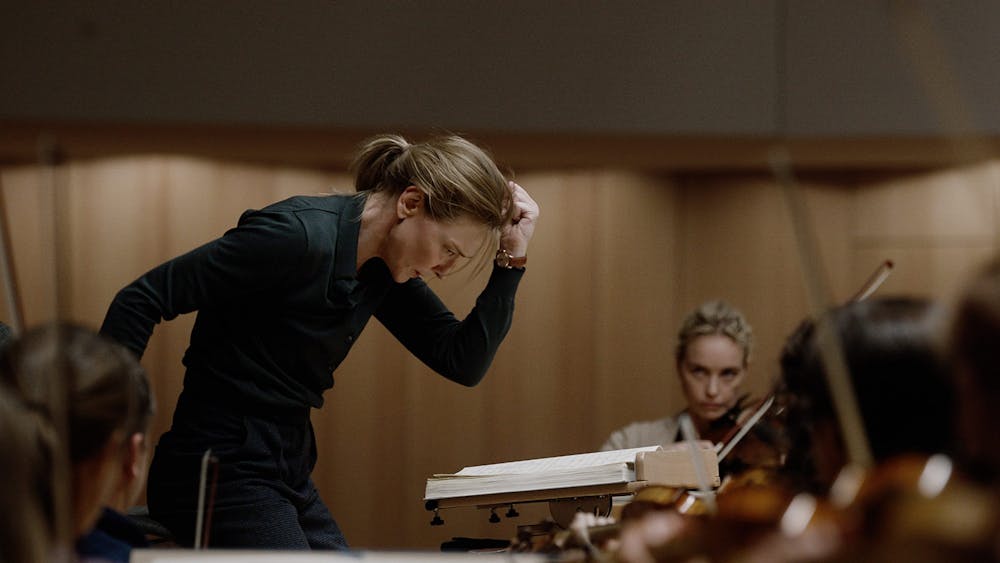It wouldn’t be a true awards season without talking about the latest film starring Cate Blanchett. In the case of 2022, this happens to be writer-director Todd Field’s “Tár.” After receiving a strong critical reaction at the Venice Film Festival earlier this year, it finally saw release here in Albuquerque on Friday, Oct. 21, allowing us commonfolk to dig in to the masterpiece that Field has crafted.
This is a film best approached with as little information as possible, so I will keep my summary extremely broad: it centers on world-renowned composer Lydia Tár (Blanchett) who slowly becomes embroiled in controversy during final preparations for a career-setting performance. This summary is extraordinarily reductive, but part of what made “Tár” most striking is how shocking it is, due in large part to how little I knew about it going in.
Another one of the most striking things about “Tár” is the title. Derived from the last name of the fictional composer the film centers around, one might deduce that the film is actually a biopic based on a real composer that, given the lapse in popularity classical music has seen in recent years, is unknown to the vast majority of audiences. It’s a subtle hint to the somewhat unique approach the film takes in making Tár feel like a real person and establishing her as a personality that could exist within our world.
There are two main elements that accomplish this feat. The first is Blanchett’s work in the title role. Of course, if you sit down to watch any film with her in it, you’re probably in for a treat; she is easily one of the best actors working today. And, in typical Blanchett fashion, “Tár” finds her once again surpassing the already high bar she has set for herself. The way in which she inhabits and breathes life into the character of Tár is truly incredible. Her complete immersion into Tár’s world completely immerses the audience as well.
The second element is the level of detail in the film. Field, whose last directorial effort was 2006’s “Little Children,” may as well have spent the last 16 years conducting research for “Tár”. Every detail — from Tár’s mannerisms to the vinyl collection we see her mulling over early in the film — feels painstakingly thought out in a way other films could only dream of. This conviction to placing the world of the film within the real world gives very little degree of separation between fact and fiction in a highly engrossing manner.
This precision carries over into Field’s screenplay and even more so his directing. This is a slow film and it may try the patience of many, but the pacing is deliberate and intentional — palpably so. Each scene is felt rather than seen, allowing the audience to engulf themselves within the world of the film. The slowness of it burns with a fiery tension as the film’s stakes grow progressively, with the plot practically begging Field to speed up. But he never gives in.
The film’s visuals help to aid in the dedication to realness. There’s a real modern slickness to the look of the film: the color palette is dull, yes, but it’s one of few films to make effective use of it. Blanchett’s Tár is often dressed in black and white clothes and surrounded by black and white set pieces, making for many moments that feel as if you’re watching a highly saturated black-and-white film. The dull and drab colors keep the film grounded, even with a few creative embellishments on behalf of Field.
In my attempt to reveal as little as possible, I don’t want to speak too heavily on the plot of the film. That being said, it is another standout element and, thus, I feel it must be spoken on. It resembles Scorsese’s “Raging Bull” in many ways, but its incorporation of many modern themes and ideas keep the film fresh. It’s certainly bound to start a discussion amongst those who watch it — “they’re just blue curtains,” anti-intellectuals beware.
Ultimately, “Tár” is one of the best, if not the best film to release this year: a nearly career-best performance from Blanchett, masterful directing, awesome precision and gorgeously slick visuals all come together in a film that is sure to be imitated, but never outdone. To miss out on it would be to do yourself a “Tár”-ibble misservice.
John Scott is the editor-in-chief at the Daily Lobo. He can be contacted at editorinchief@dailylobo.com or on Twitter @JScott050901
Get content from The Daily Lobo delivered to your inbox






